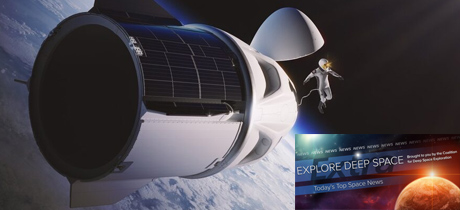In Today’s Deep Space Extra… A group of astronomers calls for keeping the Moon’s far side free of radio interference in order to study the universe’s early epoch. China seeks formal lines of communication with the U.S. for space safety.
Human Space Exploration
Russian cargo ship launches in pursuit of International Space Station
Coalition Member in the News – Northrop Grumman
Spaceflightnow.com (2/15): Russia’s Progress MS-19 launched to the International Space Station (ISS) late Monday with a more than 5,500-pound cargo from the Baikonur Cosmodrome in Kazakhstan. The resupply capsule is on a course to dock autonomously with the orbital lab’s Russian segment Poisk module on Thursday at 2:06 a.m. EST. The cargo includes fuel, food, water, and experiments.
SpaceX and Isaacman to partner on series of crewed Dragon and Starship flights
SpaceNews.com (2/14): Jared Isaacman, the billionaire that served as commander of the orbital, Inspiration4 private astronaut mission in September, on Monday announced plans for a series of missions called Polaris that intend to work toward the first crewed launch of SpaceX’s Starship. Polaris Dawn, the first mission, is planned for no sooner than the fall of 2022. Launched aboard a Crew Dragon, the four-person crew on Polaris Dawn plans to orbit the Earth at a high altitude for up to five days and include a spacewalk among their activities.
Space Science
Moon group pushes for protection of ultra-quiet lunar far side
Space.com (2/14): The newly established Moon Farside Protection Permanent Committee, which is associated with the International Academy of Astronautics, is calling for an effort to protect the Moon’s far side from radio frequency interference (RFI) as cislunar space draws more attention for human exploration and settlement. Without interference, the Moon’s far side could serve as the host for radio observatories prepared to study the universe’s early epochs known as the dark ages and cosmic dawn.
Astronomers scan the center of the Milky Way for any sign of intelligent civilizations. Nothing but silence
Universetoday.com (2/14): A brief seven-hour search for low frequency radio waves emanating from the center of the Milky Way Galaxy, and specifically 144 exoplanetary systems, was unsuccessful in its bid to detect radio waves that could be linked to intelligent civilizations. The effort was led by an Australian researcher using the Murchison Widefield Array. The search region was selected for its density of stars that might have habitable planets. The study effort is outlined in the paper, A Search for Technosignatures toward the Galactic Centre at 150 MHz.
Opinion
Nuclear thermal propulsion is key to keeping peace in space
The Space Review (2/3): The successful development of space nuclear power technologies is a key to maintaining leadership in the space domain, writes Alex Gilbert, of Zeno Power, a developer of radioisotope space power sources. “Russia and China increasingly see space nuclear technologies as tools to establish strategic and economic dominance. Congress has a significant opportunity to respond by further incentivizing NTP (nuclear thermal propulsion) both in government and across industry. But beyond the technical challenges is a question of human will: the U.S. has to accelerate a bipartisan focus on developing these capabilities for them to truly take off and solidify a peaceful path for human activities in outer space,” he writes.
Other News
China proposes formal lines of communication with U.S. on space safety
SpaceNews.com (2/15): At a February 10 press conference, Zhao Lijian, spokesman for China’s Ministry of Foreign Affairs, said China was open to formal lines of communication with the U.S. on space safety. “With a view to protecting the safety of Chinese astronauts and space station, the Chinese side stands ready to establish a long-term communication mechanism with the U.S. side and hopes that the U.S. will take concrete measures to prevent such incident from happening again,” he said.
Bipartisan legislation seeks to reform FCC satellite licensing rules
SpaceNews.com (2/14): House Energy and Commerce Committee Chairman Frank Pallone, Jr. (D-NJ) and ranking member Rep. Cathy McMorris Rodgers (R-WA), released drafts of two bills they say will better equip the Federal Communications Commission (FCC) for regulating a surge of non-geostationary orbit (NGSO) satellites. The legislation touches on foreign ownership rules, space sustainability, license processing timelines and satellite spectrum sharing, and comes after the FCC issued a notice of proposed rulemaking (NPRM) to update licensing rules. FCC Chair Jessica Rosenworcel said she welcomed the legislation.

